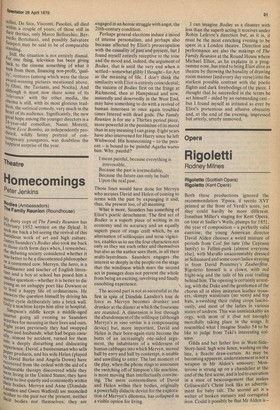Homecomings
peter Jenkins tOdies (Ambassadors) ne Family Reunion (Roundhouse) ,MY dusty copy of The Family Reunion has "ebruary 1952 written on the flyleaf. It t49°k me back a bit seeing the revival of this j'asticlious work of art and high culture. tantes Saunders's Bodies also took me back 1° those sixth form days when, I remember, the debating society considered whether it I'VaS better to be a discontented philosopher ?a contented cow. Mervyn, the hero, is a hr and teacher of English litera41. re and a boy at school has posed him a sintilar question — whether it is better to die ,Yeung as an unhappy poet like Dowson or lead a happy life of ordinariness. He answers the question himself by driving his l0t3tor cycle deliberately into a brick wall. lily a machine keeps him alive in hospital. Simpson's riddle keeps a middle-aged quartet going all evening as Saunders se,.arches for meaning in their lives and ours. ..Ight years previously they had swapped ,*,t,ves and husbands; what had begun casu!`"Y, almost by accident, turned for them 'Inc a deeply disturbing and dislocating el(Perience. David, a businessman who sells Ii3)aPe1. products, and his wife Helen (played Y David Burke and Angela Down) have rceeovered from the ordeal with the aid of a 'ashionable therapy discovered while they ‘,vere living in the United States; they have !earnt to live quietly and contentedly within their bodies. Mervyn and Anne (Dinsdale La.ltsden and Gwen Watford) are reconciled tiletther to the past nor the present, neither "elr bodies nor themselves; they are I mean painful, because everything is irrevocable, Because the past is irremediable, Because the future can only be built Upon the real past.
Those lines would have done for Mervyn who accuses David and Helen of coming to terms with the past by expunging it and, thus, the present too, of all meaning.
What is more, Saunders has something of Eliot's poetic detachment. The first act of Bodies is a superb piece of writing in its economy and its accuracy and an equally superb piece of stage craft which, by an alternation of soliloquies and terse vignettes, enables us to see the four characters not only as they see each other and themselves but also as the author sees them, in all their multi-layerdness. Saunders engages the interest so deeply in the people on the stage that the windiness which mars the second act in passages does not prevent the whole from being an exciting, involving and finally ennobling experience.
The second part is not as successful as the first in spite of Dinsdale Lansden's tour de force as Mervyn becomes drunker and drunker at the dinner at which the foursome are reunited. A dimension is lost through the abandonment of the soliloquy (although Mervyn's in vino veritas is a compensating device) but, more important, David and Helen in their born-again state become the butts of an increasingly one-sided argument, the inhabitants of a wilderness of human cabbages into which Mervyn, moved half by envy and half by contempt, is unable and unwilling to enter. The last moment of the play, when the phone rings to announce the switching off of Simpson's life machine, is more moving than intellectually convincing. The mere contentedness of David and Helen within their bodies, originally a powerfully didactic device for the exploration of Mervyn's dilemma, has collapsed as a viable option for living.






































 Previous page
Previous page